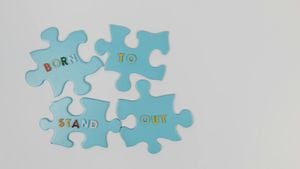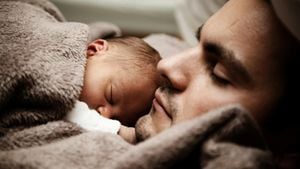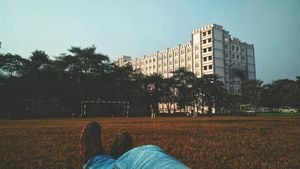Kirstie Allsopp, the renowned TV presenter known for her role on Location, Location, Location, has sparked significant debate with her recent decision to allow her 15-year-old son, Oscar Hercules, to travel through Europe unattended. This summer, Oscar embarked on a three-week interrailing adventure with his 16-year-old friend, visiting iconic cities including Paris, Brussels, and Berlin.
While many applauded Allsopp's parenting choice, viewing it as a step toward fostering independence, others criticized it as irresponsible. Social media erupted with comments from concerned parents wondering if 15 was simply too young for such freedom.
"If we're afraid, our children will also be afraid; if we let go, they will fly," Allsopp stated on her social media, shedding light on her parenting philosophy. Her remarks generated both support and backlash, with some seeing her stance as emblematic of contemporary parenting challenges.
For Allsopp, enabling her son to navigate Europe alone is about instilling confidence and independence. She noted, "For obvious budget reasons, interrailing isn't on the cards for everyone, but it’s important to find ways to give our children confidence through trusting them."
Among the critics were parents expressing concerns over the potential dangers of young travel. One critic emphasized, "I think 15 is too young... if things had gone wrong, you would have taken responsibility and never forgiven yourself," capturing the fears many parents share.
Conversely, some voices supported Allsopp's decision, reminiscing fondly about their own youthful adventures without parental oversight. Supporters noted the richness of experiences gained from traveling independently at a young age can significantly contribute to personal development.
Sharing her reflections on BBC Radio 4, Allsopp mused about generational changes and the growing worries parents face. "We have to ask ourselves – how much of this is due to our fear and worry, and how much is because of 24-hour news coverage creating the perception of a more dangerous world?"
Allsopp compared modern attitudes to historical contexts, recalling her father-in-law’s involvement with the Arctic convoys during World War II at age 16. This led to her pondering whether today's parents are overly cautious compared to past generations.
The reality is, teenage mental health issues have surged, particularly highlighted during the pandemic years. Many educators and psychologists advocate for calculated risks, arguing they play a pivotal role in developing resilience and coping skills.
According to Allsopp, trusting young people with responsibilities could be key to addressing these mental health trends. By allowing teenagers their freedom, they might find the confidence needed to navigate challenges head-on.
With her standpoint shaped by what she perceives as responsible parenting, Allsopp characterized Oscar as sensible and well-prepared—a mantra echoed by many who support her views. "He's never been in trouble at school, and when he asked to do this, I thought: ‘Right, okay, good on you,’" she shared.
Still, concern lingers about the specific challenges young travelers may face alone. Social media discourse often revolves around issues of safety, with some advocating for more structure and supervision.
While reactions varied, Allsopp highlighted the need for open conversations about independence and parental anxiety. She welcomed criticisms as part of broader discussions on the appropriate age for such levels of freedom.
Criticism turned slightly more personal when she addressed the question of gender. Responding to concerns about whether she would allow her daughter similar freedoms, Allsopp asserted her position would remain unchanged, emphasizing trust and safety regardless of gender.
"Statistically, boys are more likely to have violent encounters with strangers," she explained, attempting to dismantle some of the conventional concerns around young traveling.
Through her experiences and childhood reflections, Allsopp encourages parents to reconsider their upbringing methods. "Why do we infantilize young people?" she asked, pushing back against the narrative of needing to protect children at all costs.
Academics and children’s rights advocates have engaged with Allsopp's comments, raising questions about the balance between safety and fostering independence. They viewed her approach as both refreshing and challenging traditional views on parenting.
Critics and supporters alike admit there is much to unpack about this topic. Allsopp herself said, "It’s not about winding people up, it’s about openly discussing the responsibilities we afford our young people."
Representatives from youth organizations weighed in, underlining the importance of giving young people opportunities to experience the world. They note those experiences can be instrumental for personal growth.
More broadly, the conversation about youth independence has been gaining momentum. Parents, educators, and researchers are engaging with these ideas, discussing healthy boundaries and risk management.
Responding to feedback, Allsopp has encouraged parents to nurture their children’s independence. She believes productive conversations about freedom can reshape how we view teenage capabilities.
Finally, her call for change includes asking parents to trust their instincts and their children’s competence. Allsopp’s story also serves to remind us all about the delicate balancing act of raising kids today.
So, whether you agree with Allsopp or not, her situation has opened the door for meaningful discussion about independence in parenting. How far should we let our children roam free and how do we equip them for the world? These remain compelling questions for parents everywhere.
At the end of the day, the dialogue has begun, and the stakes are high as society continually debates the right path forward for the next generation of travelers.
Perhaps, as the dust settles, Allsopp's experience will inspire parents to cater to independence within safe parameters. Empowering kids like Oscar might not only build their character but also help create healthy, adventurous adults.



